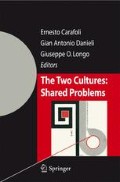Abstract
There is a concept which corrupts and upsets all others. I do not refer to Evil, whose limited realm is that of ethics; I refer to the infinite. I once longed to compile its mobile history. The numerous Hydra (the swamp monster which amounts to a prefiguration or emblem of geometric progressions) would lend convenient horror to its portico; it would be crowned by the sordid nightmares of Kafka and its central chapters would not ignore the conjectures of that remote German cardinal — Nicholas of Krebs, Nicholas of Cusa — who saw in the circumference of the circle a polygon with an infinite number of sides and wrote that an infinite line would be a straight line, a triangle, a circle, and a sphere (De docta ignorantia, I, 13, [1]. Five, seven years of metaphysical, theological, and mathematical apprenticeship would allow me (perhaps) to plan decorously such a book. It is useless to add that life forbids me that hope and even that adverb [2].
Access this chapter
Tax calculation will be finalised at checkout
Purchases are for personal use only
Preview
Unable to display preview. Download preview PDF.
References
J. Hopkins: Nicholas of Cusa on Learned Ignorance: A Translation and an Appreaisal of De Docta Ignorantia (The Arthur J. Banning Press, Minneapolis 1985)
J.L. Borges: Avatars of the Tortoise. In: Labyrinths (Penguin Books, Harmondsworth 1970)
L. Diogenes: Lives and Opinions of Eminent Philosophers (Kessinger Publishing Co., Whitefish 2007)
Aristotle: Physics (Oxford University Press, Oxford 1996)
Hui Shi, in The complete works of Chuang Tzu (Columbia University Press, New York and London 1968)
Plato: Parmenides (Focus Philosophical Library, Newburyport 1996)
L. Sterne: The life and opinions of Tristam Shandy, Gentleman (Penguin, London 2003)
L. Carroll: What the Tortoise said to Achilles, Mind, 4 (1895)
L. Wittgenstein: Philosophical Investigations (Prentice Hall, Englewood Cliffs 1987)
F.H. Bradley: Appearance and Reality: a Metaphysical Essay (Adamant Media Corporation, Boston 2005)
J. Royce: The World and the Individual (Peter Smith Inc., Gloucester 1976)
J.L. Borges: El Hacedor, Dreamtigers (University of Texas Press, Austin 1964)
F. Kafka: The great wall of China. In: The Complete Short Stories (Vintage, United Kingdom 1992)
P. Odifreddi: Un matematico legge Borges, Le Scienze 372 (1999) 76–81
J.L. Borges: Death and the Compass. In: Labyrinths (Penguin Books, Harmondsworth 1970)
J.L. Borges: The God’s Script. In: Labyrinths, (Penguin Books, Harmondsworth 1970)
Author information
Authors and Affiliations
Editor information
Editors and Affiliations
Rights and permissions
Copyright information
© 2009 Springer-Verlag Italia
About this paper
Cite this paper
Odifreddi, P. (2009). And the Eternal Zeno Springs to Mind. In: Carafoli, E., Danieli, G.A., Longo, G.O. (eds) The Two Cultures: Shared Problems. Springer, Milano. https://doi.org/10.1007/978-88-470-0869-4_4
Download citation
DOI: https://doi.org/10.1007/978-88-470-0869-4_4
Publisher Name: Springer, Milano
Print ISBN: 978-88-470-0868-7
Online ISBN: 978-88-470-0869-4
eBook Packages: Humanities, Social Sciences and LawPhilosophy and Religion (R0)

